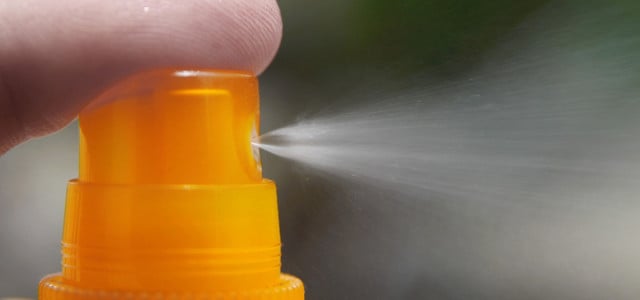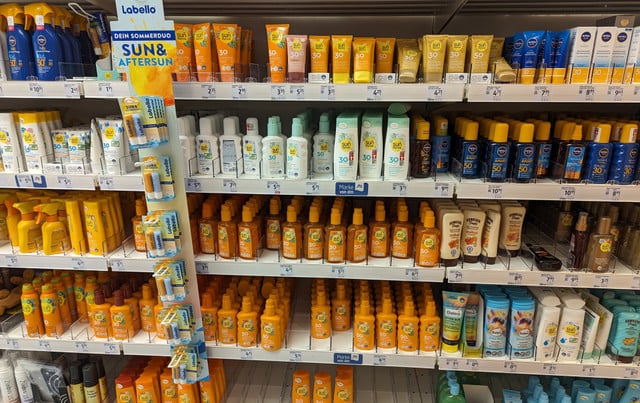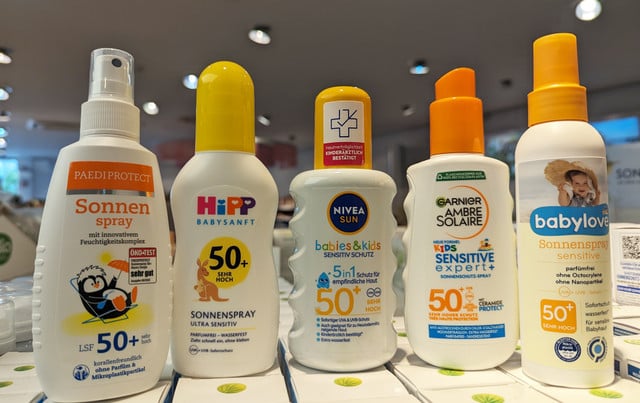
Sunscreen spray is practical: Spray sunscreens are easier to apply than creams from tubes or bottles and they are helpful when it comes to reaching the back and shoulders. But are they as effective as sunscreen? What should you bear in mind when using them? We asked an expert.
Sunlight puts many people in a good mood and gives them a wonderful summer feeling – but we have to protect ourselves from its dangers. Keyword: sunscreen. When applied correctly, sunscreen protects the skin from dangerous UVA and UVB rays and reduces the risk of skin cancer, sunburn, premature skin aging and unsightly skin discoloration.
Sun spray or sun cream?
The selection of sunscreens in the drugstore is huge – it is difficult to decide which one to buy:
-
Sun protection factor 20, 30 or 50?
-
Do children need special sunscreen?
- Which sunscreens performed best in tests?
- Another important question is: sun spray or sun cream?
We wanted to know whether a sunscreen spray or a traditional lotion from a tube or bottle is the better choice, so we did some research.

Is sunscreen spray as effective as lotion?
The short answer is yes. The various sun protection alternatives differ in their texture, but not in their effect. This means that products with the same sun protection factor and the same UVA rating are equally good at protecting the skin. “The manufacturers themselves ensure through appropriate tests that their products meet the advertised SPF and UVA protection,” explains Christine Throl, editor at Öko-Test and responsible for sun cream testing. Stiftung Warentest also carries out regular tests and checks the advertised SPF and UVA.
Of course, the prerequisite is always that the products are used correctly.
So whether you rub a sunscreen with SPF 50 on yourself or spray a lot of a sunscreen spray with SPF 50 into your hand and rub it on, the effect is the same. It’s different if you spray the spray onto your skin.
What are the pros and cons of sunscreen sprays?
The biggest advantage of sunscreen sprays is that they are practical. And many people find spraying more fun than applying cream. But there are also a few points that clearly speak for the cream variant and against the spray: sprays are often applied too sparingly, their use is only recommended when there is no breeze and the sprays should not be inhaled either.
“As a dermatologist, I am not a fan of sun sprays,” says Christoph Liebich, a dermatologist in Munich. For one simple reason: “Most of the cream does not reach the skin when using sprays.”
Expert tips for using sun spray
Anyone who uses sun sprays should consider the following points:
#1: Don’t use sunscreen spray too sparingly
Hardly anyone knows how much sunscreen is really needed to protect the skin. “That’s 2 milligrams of sunscreen per centimeter of skin surface,” explains Christoph Liebich and calculates: “For a person who is 1.80 meters tall, you need 20 to 25 milliliters of sunscreen. For each application.” That’s around three to four tablespoons.
Harvard Medical School points out that most people are particularly sparing when applying sunscreen sprays: “Studies of sunscreen sprays show that many people apply only a quarter of the amount needed. To achieve a sun protection factor (SPF) similar to a lotion or gel, you must spray each part of the body for up to six seconds.”
#2: Sunscreen sprays are not suitable for the face
The US Food and Drug Administration (FDA) advises against using sunscreen sprays near the face. The spray can irritate the lungs when inhaled, especially in people with conditions such as asthma.
#3: Only apply sunscreen sprays in windless places
A study by Griffith University in Brisbane examined the loss of sunscreen when sprays are used in different wind strengths: Even in a light breeze of 10 km/h, the research team observed a sunscreen loss of 54 percent. “On windy days, Australians who use aerosol sunscreen could waste up to 93% of their bottle as the sunscreen is carried by the wind into the environment, where it can have consequences for coastal ecosystems,” explains Dr. Elke Hacker, senior research fellow at Griffith University’s Menzies Health Institute Queensland. And what applies to Australians is of course equally true in all other places in the world where sunscreen is applied in windy conditions.

When does sun spray make sense?
Dermatologist Christoph Liebich recommends sunscreen in spray form for acne patients, for example. “The sprays often have a lower fat content and are therefore better suited for sensitive acne-prone skin.”
His tip: “It’s better to spray the sunscreen into your hand – and not directly onto your body – and then apply the cream like normal sun lotion.” Then you know what really gets to your skin.
Even if you’re in a hurry or if your child is vehemently against applying sunscreen, a sun spray and the fun spraying action that comes with it is often the key to success. Because the motto is: No matter what type of sun protection you choose, the main thing is that you protect your skin – and that of your children – from dangerous radiation.
Read more on Techzle\.com:
- Old sunscreen: Can you still use last year’s cream?
- Organic sunscreen: effective protection without risk?
- Study: Old sunscreen can develop carcinogenic substances
- Sustainable sunglasses: good UV protection and little plastic
** marked with ** or orange underlined Links to sources are partly affiliate links: If you buy here, you are actively supporting Techzle\.com, because we then receive a small part of the sales proceeds. .